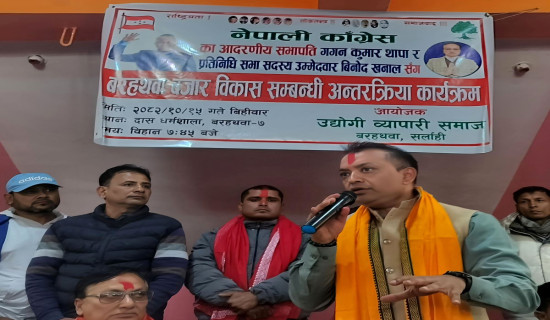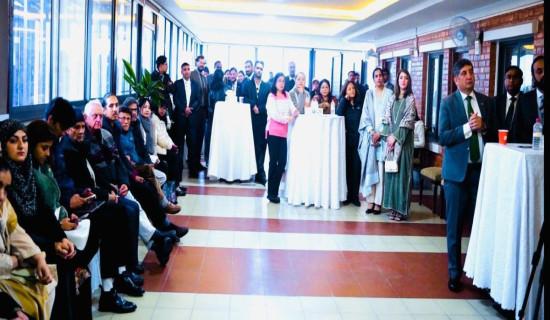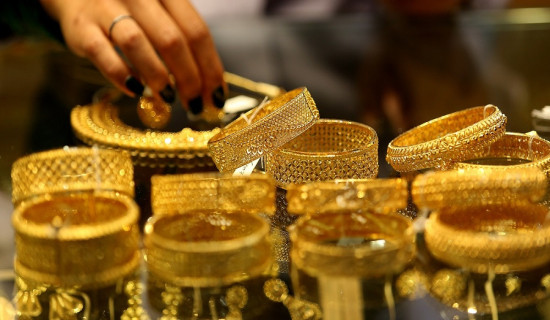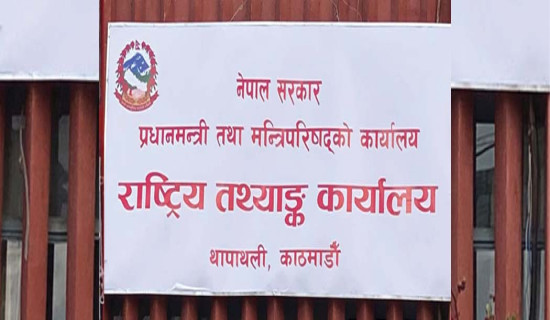- Friday, 30 January 2026
Savour jackfruit and enjoy numerous health benefits
Kathmandu, July 25: It is the season to enjoy jackfruits. If you visit the fruit and vegetable markets in Kathmandu, you can see heaps of ripe jackfruits waiting for customers at many shops.
"It costs around Rs. 70 per kilogram," a shopkeeper was heard responding to a buyer at Pepsicola. "If you want to take only meats, it costs Rs. 150 per kg."
In Kalimati, the entire market is filled with the smell emanating from the ripened jackfruits these days.
Most people like to eat the largest fruit, however young people grown in cities tend to avoid it, as they find it strange in size and taste.
I do not like it but my father loves to eat it almost every day, said Abhaya Subedi, who was at a jackfruit shop in Pepsicola. There are others who fear to eat it as they think the sweet fruit triggers blood sugar.
However, if one goes through science journals and others, he will find it that jackfruit is good for health. It helps maintain metabolic system. But only a few people know this aspect of jackfruit and its seeds.
Jackfruit, as the jack of all fruits is a rich source of vitamin, minerals, phytonutrients, carbohydrate, electrolytes, fiber, fat and protein.
Jackfruit seeds are equally useful to keep ourselves healthy. We consume jackfruit due to its taste and aroma, we normally throw away its seeds, which are like gravels. Jackfruit seeds are indeed very rich in protein and nutritious.
Both jackfruit and its seeds help us fight wrinkles, get a glowing complexion, flawless skin, maintain blood pressure and above all lower sugar levels.
The list of benefits of taking jackfruit and its seeds is long—it improves digestion, prevents colon cancer, improves eyesight, skin health and ageing, asthma, bone health, anemia, cold and infection, prevents bone loss, keeps thyroid healthy, supports bowel regularity, helps prevent night blindness, lowers risk of heart disease and ulcers!
No priority of government for its cultivation
Although consumption of jackfruit is a popular practice, jackfruit farming is yet to be commercial in Nepal. Only limited farmers have planted jackfruit trees in their unproductive lands for self-consumption.
Despite having multiple benefits in consumption and potential for production in Nepal, there is no priority of the government of Nepal for its cultivation and encourage farmers as well, said Gopal Prasad Shrestha, horticulture expert.
"As this fruit is not only beneficial for health, but also helps maintain food security, the government should pay attention in research and introduce the programmes for its cultivation in Nepal," he said.
According to statistics of Ministry of Agricultural and Livestock Development, jackfruit is grown only in around 2,300 hectares of land across the country and the jackfruit trees of only around 1,900 hectares land produce fruits.
Around 2,200 tonnes of jackfruit is produced annually in the country.
Mahesh Chandra Acharya, chief of National Centre for Fruits Development, admitted that the government has yet to introduce any specific programmes and give priority to jackfruit cultivation.
He, however, noted that there is huge potential for its cultivation in the country as it can grow from Tarai up to 1,700 meters altitude.
He said that although jackfruit is cultivated in Nepal in two seasons, early and late, it is available for six months of the year.
"People are being consumed jackfruits as vegetables in large amount while it is being consumed as fruits," Acharya told The Rising Nepal.
The tree of jackfruits is also good for making wooden utensils like Theki and other items, he said.
Highest production in Madhes Province
Most jackfruits in Nepal are produced in Madhes Provinces. Around 9,000 tonnes of jackfruits is being produced in around 700 hectares of land in Madhes Province. Among the districts of Madhes Province, highest amount of jackfruits of 5,500 tonnes is produced in Dhanusha.
Likewise, around 3,500 tonnes of jackfruits is produced in Koshi Province, 2,100 tonnes in Bagmati, 1,700 tonnes in Gandaki, 4,200 tonnes in Lumbini, 735 tonnes in Karna
li and 661 tonnes in Sudurpashchim Province.
These days the local traders can be seen selling ripe jackfruits at different locations of the Kathmandu Valley. One can buy them in Chabahil, Pepsicola, Kalanki and Old Baneshwor.
The traders bring ripe jackfruits mostly from Kavrepalanchowk, Dhadinga and Gorkha.
The minimum cost of a ripe jackfruit is Rs. 30 a kilo at Kalimati Market, said Bhagawan Chandra Upreti, trader of Kalimati Fruits and Vegetable Market.
However, the price varies on the basis of localities and traders. Similarly, a few traders tend to sell in lump sum piece instead of weighing them. Normally, price of a jackfruit is in between Rs. 80 to Rs. 200 depending on the size and quality.
Around 10-15 tonnes of jackfruits arrive in Kathmandu daily at present, he said.
The jackfruits produced in districts of Tarai regions are consumed as vegetables in the month of Baishak, Jestha and Asar, he said.
















